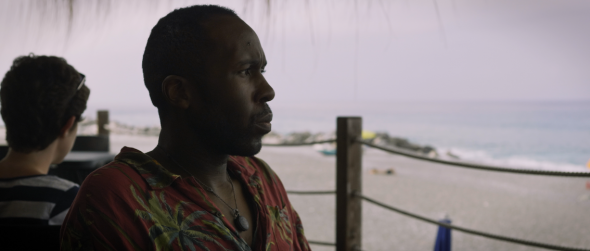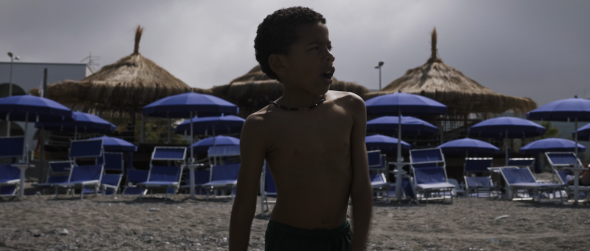An absurd distraction

I watched Danting Chen’s (陳丹婷 Chan Tan Teng in Cantonese) latest short film “Family Trip”, with total running time of 9 minutes and which recently premiered at Toronto Black Film Festival and Los Angeles’ Pan African Film & Arts Festival. In this short film, Danting approaches “an absurd distraction” through several sous-entendus about racism and black refugees in southern Italy, while casting a critical glance at how children, who are defenceless and need guidance, become victims of the complexity of the world of adults.
Danting Chen is one of my rare Chinese friends in Berlin. we met at a Chinese queer film event two years ago but it wasn’t until one year ago that we started to talk in person. When we met before the total lockdown in Berlin, I immediately identified with her “southern” Mandarin: we do not roll our tongues when we speak the language, unlike the northern Chinese; Danting speaks both Yúnnán dialect and Mandarin as her mother tongue, me Cantonese.
Danting is a Yunnanese filmmaker from the Baips, one of the Chinese official minorities. Born in 1995 in Qǔjìng, a city bordering Yúnnán’s capital Kūnmíng, Danting trained as an engineer and is now a professional film editor and colorist who has been living in Berlin since 2016. Ascribed to her connection to and also detachment from her hometown and home country, the theme of identity reoccurs in Danting’s spectrum of work, which can also be seen in another short film of hers, “Accident” (2019), where she appears herself as one of the main characters, talking directly about the mosaic of identity experienced by two Chinese sisters who only reunited as adults in their emigrant home in Berlin.
“Family Trip” was made during Danting’s participation in the film residency “Kino Guarimba” in 2019 in Amantea, one of the southern coastal towns in which the onshore African migrants take refuge in Italy. Instead of portraying problems in a direct way, however, Danting preferred to present her worldview through the juxtaposition of several cinematographic sous-entendus. And, instead of direct storytelling with the problematization or victimization of refugees or migrants, she chose to talk about how the childhood of both emigrant and native children can be disturbed or even ruined by “absurd distractions” in this politically perilous world.
The Baips may not be among the most well-known Chinese official ethnic minorities, but Yúnnán as a Chinese province is known as a melting pot of different cultures with its preserved minority cultural legacies and the frequency of both domestic and international tourists. When I asked Danting how her filmic narrative could be different from the majority Han people, she replied with a single Chinese character “野,” meaning wild. In her words, “wild” because it is “primitive and original,” “wild” because it is “untamed and honest ,” and “wild” because it is “home brought back to life” and poetic in its own sense.
None of this is seen in her new short film “Family Trip”, however. By contrast, she presents calmness and slowness, albeit with precision. Precise is the key to how she attempts to present her audience with entanglement and multiplicity in a discrete narrative. I try to prevent myself from judging this way of telling a story as somewhat “East Asian,” but the way in which East Asian filmmakers tell a completely non-East-Asian story intrigues me both aesthetically and philosophically.

The story of “Family Trip” is rather simple, in the sense that Danting, as she told me, opted out of the traditional structure of a drama and instead looked for the quality of being lyrical and poetic, with the location deployed as a character itself. The film depicts a sequence of events: an African father (played by Saddiq Abubakar), his son and his girlfriend (Portuguese-South-African actress Salber Lee Williams) take a “Family Trip” back to the town where the father and son first arrived in Italy - either for the sake of reminiscence or as a manoeuvre to explain to his son why they ended up here. While the couple is enjoying their romantic moment, on the beach the young boy befriends a young Romanian-Italian girl, who immediately asks in Italian: “Did you arrive by boat?”
As a Han (or Hon in Cantonese) and a visual anthropologist myself, I could not keep myself from committing the anthropological sin of regarding my compatriot as a friend of domestic exoticism. “How wild is the wildness of a Baip? How different is this wildness in your filmmaking from Han filmmaking?” Then Danting named Bì Gàn (畢贛), an emerging Chinese filmmaker from Guìzhōu province whose debut feature film, “Kaili Blues” (2015), was an international success while his latest work, “Un grand voyage vers la nuit” (2018), was selected for “Un certain regard” in Cannes.
Back to Danting’s “Family Trip.” She adopted an explicit mode to tell how all these absurd distractions led to the boy in her story being killed: after the African couple’s romantic moment in their hotel, they came out to the beach and found their son disappeared. This first absurdity - they left their son on a beach - was followed by the second one: a Romanian-Italian couple becomes furious over the drowning of their daughter and immediately blames the African couple and their son for the accident. They successfully catch everyone’s attention, including the African couple themselves, making them waste time explaining things they haven’t done and preventing them from looking for their son. It should not be forgotten that the Romanian-Italian couple, who were having a fight, also absurdly left their daughter on a beach.
Danting is clear with her intention. She was not in Italy to problematize or victimize the refugees or migrants. She was there to tell a story with her own poetics and narrative. I can not agree more with Rainer Maria Rilke that art should not be critiqued, and I do believe that I must fail in writing any critique, since I only follow my own instinctive way of following art. In this sense, and in my personal perception, I am glad to have discovered a filmic narrative from a Chinese Baip filmmaker. Her name is Danting Chen.
*
The article was originally published in Portuguese in Jornal Tribuna de Macau on 5 March 2021. The author thanks Zoe Aiano for the kind suggestions to improve the text in English while nevertheless assuming the whole responsibility.